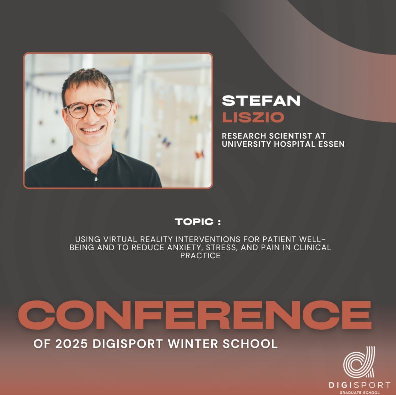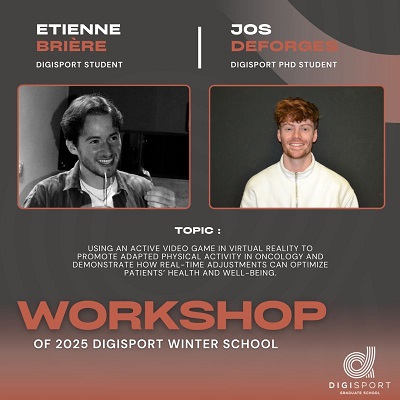
Julien Lomet will present the Creative Harmony project, a collaborative virtual reality work inviting viewers to co-create a virtual landscape together through gestures. The work encourages self-discovery and exploration of one's relationship with nature and others. The virtual reality device, inspired by German Romantic painting, offers collaborative interactivity, letting go and relaxation. Slowly, let yourself be immersed in the work.

Pedro Saint-Maurice, research scientist at theBreast Cancer Research Program — Champalimaud Foundationin Lisbon and President of theInternational Society for Diet and Activity Methods, will be joining us for our Winter School.
His talk will describe the applications of wearable devices for measuring human movement and characterizing sedentary behaviors, physical activity, and sleep in the context of cancer prevention and survivorship. The talk will cover important gaps related to the application of wearables in cancer research and methodological challenges and opportunities to improve assessments of activity/sleep behaviors in cancer patients. The talk will finalize with descriptions of wearable measurements included in a trial of supervised exercise and sleep outcomes in breast cancer patients undergoing endocrine therapy at the Champalimaud Foundation.

Hadrien CEYTE, Full Professor of Human Movement Science and Behavioral Neuroscience at Aix-Marseille Université, will be present at the DIGISPORT Winter School. He is in charge of the Master’s degree in Adapted Physical Activity & Health at the Faculty of Sport Science in Marseille and co-heads the DynamiCC team at the Institute of Movement Sciences. As Head of the Marseille site for the Doctoral School #463 Human Movement Sciences, he is also a member of the National Ethics Council for Research in Sport Sciences (CERSTAPS).
The enthusiasm for Virtual Reality (VR) is hampered by cybersickness (virtual kinetosis), despite its recognized benefits. More than one in two people suffer from discomfort (nausea, dizziness) which is a major repulsive factor, often ignored.
The lecture will take a critical approach to specifically study cybersickness: its neurophysiological origins and its cognitive/behavioral consequences, as well as individual variability. The goal is to develop innovative countermeasures for a VR experience that is accessible and beneficial to everyone.

Monique Mendelson, an Associate Professor at theUniversité Grenoble Alpes, will be present at our Winter School to deliver a lecture on the topic, "From Movement to Sleep: Advances and Challenges in Accelerometer-Based Sleep Assessment in Health Research."
Sleep is now recognized as a core component of the 24-hour movement behavior framework, opening new perspectives for physical activity researchers to explore its interactions with activity, recovery, and health. This keynote will present current advances and methodological challenges in accelerometer-based sleep assessment, from validated sleep phenotyping to emerging multimodal and contextual approaches, and will outline best practices for integrating sleep rigorously into health research.
Dr.Lars Riedemann, MDwill be present to our Winter School. He is a Specialist in Neurology and Scientist, trained in Clinical Neurology and Biomedical Engineering at theUniversity Hospital Heidelberg,Harvard Medical School, and theMassachusetts Institute of Technology. He is also an AI Engineer, Medical Community Builder, and Innovation Architect working at the Intersection of Healthcare, Artificial Intelligence, and Immersive Technologies.
Dr. Riedemann will present the rigorous process of moving Extended Reality (XR) technology beyond laboratory trials and into routine clinical workflows.
His core message is that genuine clinical integration demands a deep understanding of practical healthcare needs and user acceptance, rather than being driven by technological novelty or hype. He will cover the critical barriers to adoption, including the need for regulatory compliance, managing workflow disruption, and the necessity of demonstrating measurable clinical impact. The talk will provide attendees with a clear framework for identifying truly meaningful XR innovation, offering practical strategies to achieve sustainable integration that delivers tangible value to both patients and healthcare providers.

Dr. Stefan Liszio, research scientist atUniversity Hospital Essen, where he leads the “Patient-Oriented Application” working group at theZvRM - Zentrum für virtuelle und erweiterte Realität in der Medizinand also a member of the Pediatric Health Play Team at the Center for Pediatric and Youth Medicine, will present how Virtual Reality (VR) is being used in clinical practice to enhance patient well-being and reduce anxiety, stress, and pain.
Virtual Reality (VR) offers innovative possibilities for reducing anxiety, stress, and pain in medical contexts. Immersive virtual environments can positively shape emotional experiences and enhance well-being and stress tolerance. This lecture discusses core mechanisms such as immersion, interactivity, and presence, particularly regarding distraction and emotion regulation. Building on these foundations, the practical implementation of VR in hospitals will be explored. Examples fromUniversity Hospital Essen(Germany) —such as preparing children for MRI scans and distracting children and parents during needle punctures—demonstrate that immersive technologies are promising tools for promoting well-being and improving the patient experience in everyday clinical practice.

Jos Deforges, DIGISPORT PhD student, and Etienne Briere, DIGISPORT student, have been working closely together on the “Keep Children Active” project and will be leading a workshop during this Winter School.
This workshop will immerse participants in an Active Video Game (AVG) in Virtual Reality designed to promote Adapted Physical Activity in oncology. This innovative solution addresses the specific challenges faced by cancer patients in hospital settings, such as isolation in sterile rooms, debilitating symptoms, and loss of mobility. Participants will step into the role of players: they will take part in an AVG session within an interactive virtual environment and test, in real time, an adaptive system that adjusts their heart rate by modulating different game parameters. They will collect and visualize their own physiological and kinematic data, and then experiment with several adaptation models to compare their effects on feedback-loop regulation.
This hands-on immersion will provide a concrete understanding of how personalized physical activities can optimize health benefits for cancer patients.




